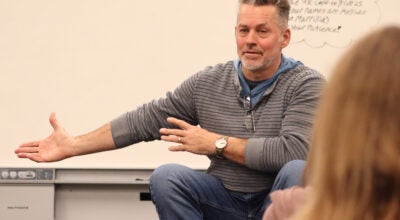To Your Good Health: Elevation, exercise and compression help fight swollen legs
Published 1:41 pm Monday, September 27, 2021

DEAR DR. ROACH: I have chronic venous insufficiency. My doctor tells me there is nothing for it but compression socks, and I cannot put them on. — S.G.
ANSWER: Chronic venous insufficiency is a disease of the veins, most commonly in the legs. It’s characterized by dilated (varicose) veins, tired or heavy legs, pain and swelling. While there are many causes of chronic venous insufficiency, such as a blood clot, most people with this condition have no other reason for it beyond the fact that the vein valves, which are supposed to keep the blood from going backward, sometimes fail to do their job as we get older. The veins get dilated and leaky as the pressure in the veins goes up.
Before I discuss compression stockings, I want to talk about two important treatments that I hope your doctor discussed with you. The first is that you can reduce the pressure in the veins of your legs by elevating them. Experience has shown that elevating your legs above your heart three or four times daily for 30-minute sessions can have a big benefit in reducing the symptoms of chronic venous insufficiency. The second is the importance of getting regular exercise. Walking causes regular muscular contractions that help the veins return blood back to the heart. Even one 10-minute walk per day (or a few walks!) can have additional benefit on top of the leg elevation.
I have yet to meet a person who cordially liked compression stockings. They are tight and not always easy to get on. One piece of advice is that, especially as a person starts using them, having a second pair of hands can be very helpful to getting them on. Once they are on, they work. They can be quite uncomfortable at first, but as the legs become less swollen, the stockings feel less tight. There are tools to help people get them on, and gloves that make it easier to grab the compression stockings. Your doctor should be giving you precise instructions on the length and desired compression of the stockings, and a surgical supply store or specialty pharmacy can measure you for the correct size. In general, stockings are worn during the day and removed at night.
Ulcers can be a complication of chronic venous insufficiency. An ulcer should be evaluated by a specialist, such as a wound care nurse. Regular skin care in addition to the elevation, exercise and compression stockings can help prevent ulcers from developing.
DEAR DR. ROACH: I understand that hair loss is not a life-threatening problem and that there are many more serious issues for the medical community to focus on. However, hair loss does bring with it a fair amount of anxiety and stress to many individuals, which result in various physical and mental health issues. I believe medical science does understand the cause of common hair loss, so why hasn’t a successful cure been developed? — B.A.
ANSWER: Because scientific work is hard and takes a long time. Yes, there are many serious medical issues, and really smart scientists are investing enormous resources into them. But I have seen just how much men and women are willing to pay to keep or get back their hair — the profit motives are enormous.
Unfortunately, the science is hard. A great deal is known at the molecular level about how hormones interact with hair follicles, but far more needs to be known before this issue can be “cured.” For now, minoxidil (Rogaine) and androgen blockers like finasteride (Propecia) provide some benefit.
* * *
Dr. Roach regrets that he is unable to answer individual letters, but will incorporate them in the column whenever possible. Readers may email questions to ToYourGoodHealth@med.cornell.edu or send mail to 628 Virginia Dr., Orlando, FL 32803.
(c) 2021 North America Syndicate Inc.
All Rights Reserved





